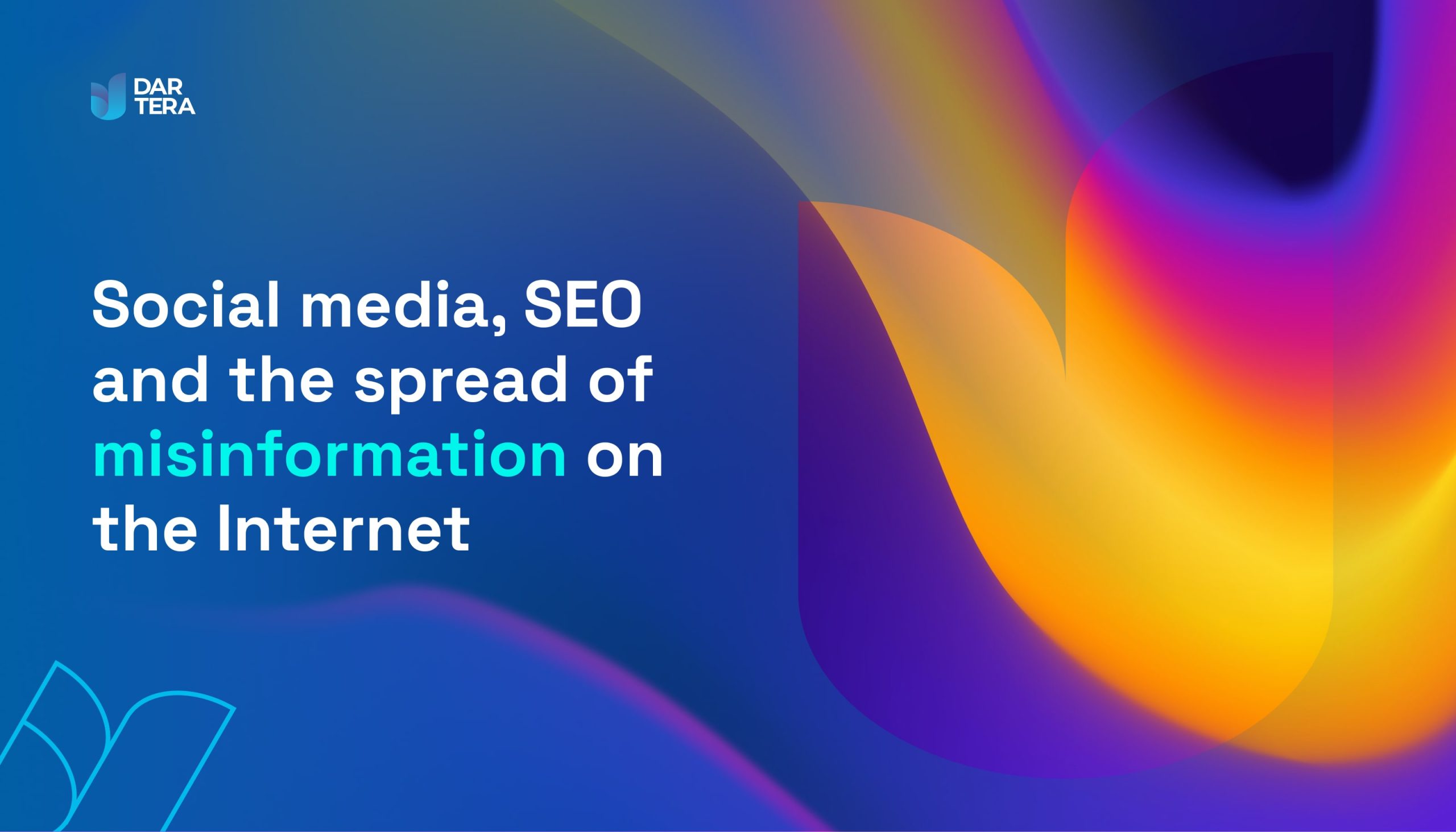Social media, SEO and the spread of misinformation on the Internet

While the boom in misinformation may have been most in the spotlight during the 2020 U.S. election, the problems were only amplified at the height of the COVID-19 pandemic. But the spread of misinformation on the Internet is not a new phenomenon and has always been a point of contention when it comes to the free flow of information in open communities.
Many may only think of the big headlines when it comes to misinformation - but in reality, malicious campaigns can affect individuals or businesses at any level, taking the form of viral social media posts or strategic negative SEO campaigns aimed at harming specific individuals or companies. However, intentionally negative SEO campaigns are not the only source of misleading audiences, as even the most well-intentioned content can be full of misinformation.
Regardless of the topic of misinformation, one thing remains true: there will never be a way to completely contain the spread of misinformation on the Internet. However, by understanding how both social media and SEO rankings change in the wake of trending topics, individuals and businesses can not only distinguish false information from the truth, but also protect themselves should they ever be targeted by a malicious campaign.

How social media contributes
Misinformation on the Internet has been around since the dawn of the Internet, but the 2020 U.S. election saw an explosion of public attention to the issue. While all social media hubs were places where misinformation festered, Twitter and Facebook seemed to be the most flooded. Despite efforts to track and stop the spread of false and potentially dangerous information related to the election, the same issues surfaced without warning and with great traction.
Anyone who has spent time on Twitter, Facebook, Instagram or any other popular social media site knows that once a topic is on everyone's lips, few things can stop it.
Unfortunately, this rule also applies to topics such as misinformation and false rumors, as well as anything else that naturally triggers arguments and discourse. Social media is designed to participate in conversations, and the topics that evoke the strongest feelings tend to make the biggest waves in the eyes of the public. In addition, social media bots can pick up trends on their own or even be developed by bad faith actors specifically to spread false information. This is a widespread problem that violates the terms of service of many social media platforms - but the proliferation of these bots has become too prevalent to solve the problem by simply blocking and restricting posting behavior.
While bots themselves violate general social media rules, the judgment against them is a bit fuzzier when it comes to actual people spreading misinformation. Roger Entner of Recon Analytics is quoted in Forbes stating, "... The platforms benefit from this" because the more outrageous the content, the more people interact with it.
He continues, "This kind of 'engagement' is what platforms are looking for; people responding to things." The same applies to "hateful" content combined with blatant misinformation.
Not only do many social media platforms allow misinformation to spread, but it is becoming increasingly difficult for viewers to discern what information is accurate and what is misinterpreted or blatantly false.

What the platforms do
While social media platforms benefit in some ways from the objective rate of engagement that comes with "enticing" and "controversial" misinformation, many have found that the risks outweigh the benefits of allowing such patterns to persist. In response to such patterns, many larger social media platforms have introduced (or attempted to introduce) tools to stop the spread of such harmful misinformation.
- Twitch, the streaming platform, promised to permanently ban streamers who are considered "chronic" spreaders of misinformation from the platform.
- Spotify, a popular music streaming app, said it would begin leaving informational messages about COVID-19 on its platform to prevent misinformation - though many critics claimed this would do little to combat rampant misinformation from some of its biggest content creators.
- Youtube announced it will crack down on misinformation about vaccines spread by content creators on the platform with new, stricter guidelines.
- Facebook, the social media giant, is perhaps best known for its rampant spread of misinformation during the 2020 election. In response, the company released a statement saying it would make changes to its policies to stop the spread.
- Instagram, which is also part of Facebook, released a similar statement to its counterpart.
Meanwhile, other social media platforms face scandals alleging that they not only blatantly ignore, but even advocate the spread of false and harmful information.
TikTok, for example, has been accused of its algorithm targeting visitors to misinformation about the ongoing conflict between Ukraine and Russia in 2022, as well as content with misinformation about the COVID-19 vaccine. This is especially concerning when you consider the age structure of the app, which is reported to include about 25% of users aged 10 to 19 and 22% aged 20 to 29 in 2021.

Where and how SEO is used
Any good SEO strategy relies on content targeting keywords, as well as trending topics with broader appeal to get links. Unfortunately, however, this can exacerbate problems with misinformation, especially if the authors of this content have not adequately researched the information they present.
Worse, this misinformation can grow and evolve exponentially, considering the amount of spam content created by bots on the Internet looking for inorganic traffic and dishonestly increasing their rankings by simply mining information from the Internet to create as much content as possible.
If Google's algorithms are unable to recognize and understand this information as dishonest and misleading, it becomes a tidal wave of false information that is then discussed, reported, and presented by a seemingly huge number of sites on the Internet - and so the trending topic continues to grow and fester. Moreover, this problem risks worsening as search trends and tools evolve and become more accessible and potentially manipulated by malicious actors.
In addition, there are a number of tactics that bad faith actors use to spread their misinformation. According to Search Engine Journal, these tactics include:
- Ambiguation: the intentional flooding of the Internet with false information.
- Google Bombing: the attempt to "redefine" a term or phrase by publishing the alternative content and directing visitors (and links) to it, so that Google's algorithms re-understand related search queries and rank the results.
- 302 Hijacking: an ineffective method of redirecting a visitor from one website to another, incorrect and possibly malicious website.
- Typosquatting, usually by misspelling common domains and/or names of well-known people to give the impression that the information presented is from those sources.
Similar to how social media platforms benefit from controversial content, search engines benefit in the same way. Controversial topics get more clicks - which means they are more likely to appear in the SERPs when the next visitor searches for a similar topic.
Many users may not know that there is a team at Google specifically dedicated to detecting and neutralizing these and other threats that evolve as the Internet evolves. In part of their business statement, they explain their work as follows: "We look for effective measures to make the Internet and society stronger and safer for everyone by focusing on helping a specific group of people - for example, journalists, civil society, or activists."
In this case, the term "open society" can refer to the Internet as a whole, but it can also refer to the smaller "societies" that emerge on social media platforms, online news forums, and other populated corners of the Internet.
In online nodes where there are established rules but no oversight, open societies are prone to misinformation and groupthink, and can become outright misinformation machines if the people involved are passionate enough about what they believe to be the truth.
But because these open societies are just that, there is no need to control the wave of misinformation that may emanate from them just by adding new rules to social media TOS and relying on Google's misinformation team - especially when SEO is actively used to spread such information, whether to intentionally cause harm or simply out of ignorance.

How a content strategy can help
Misinformation campaigns don't have to be as huge as those around the U.S. election and the COVID 19 pandemic - they can occur in smaller, more compact issues, especially when it comes to businesses and personal reputations. After all, there's a reason PR firms exist and continue to thrive in the online world.
For example, as detailed in Search Engine Journal, online furniture retailer and marketplace Wayfair experienced a huge spike in search volume seemingly out of nowhere, but it was due to a dangerous and false rumor circulating online.
Essentially, online threads surfaced alleging that random product offers from Wayfair could be linked to missing persons and human trafficking. Reuters later fully debunked this conspiracy - but at least for a short time, the misinformation circulating on the Internet with no way to stop it forced Wayfair into a massive and unexpected backlash.
Recovering from a misinformation campaign
Whether it's a massive misinformation campaign related to a controversial event, a sudden onslaught of negative attention due to misplaced scare tactics, or simply random accusations or attempts to damage reputations, deploying a content strategy to try and change the direction of SERPs may feel like an uphill battle, but it's not impossible. And while PR doesn't only come into play when a company or individual faces negative press, it is an important piece of the puzzle when it comes to negative trends.
Due to the nature of trending topics, those trying to recover from negative SEO or social media attention should target long-tail keywords on the topic or use similar wording to the topic and create content that either discredits the claims or explains the situation.
Others may also opt for a broader PR campaign that includes content on other websites to increase the distribution of the statement (like Wayfair's statement to Reuters). In addition, SEOs and business owners should be aware of self-inflicted SEO errors that could disrupt the flow of information and potentially make the situation worse.
As a victim of a misinformation trend, you should be aware above all that you will probably never completely eradicate the rumors or slander. There will always be parts of the Internet where clarifications and explanations and even apologies will not get through. However, if you respond honestly and ethically to the problem in all available public arenas, you will have an established source of truth to fall back on.
Preventing the further spread of misinformation
A second responsibility of content creators is not only to defend themselves against false claims on the Internet, but also to create new content themselves. You need to make sure that everything presented on a blog on the website as well as on social media, newsjacks, newsletters, etc. is accurate and honest.
Whether intentional or unintentional, it's easy to fall into the trap of spreading misinformation if you don't first do thorough research to verify legitimacy from reliable sources. In this context, it is important to keep in mind that most people do not actively want to spread false information. They are simply victims of the algorithm and the disinformation machine that run naturally on the Internet.
To reduce the likelihood of not only encountering misinformation but also passing it on, research project leader Kristin Lerman of USC suggests a healthy, "varied information diet" in which information comes from several different sources. These different sources of information should ideally present the same information from different angles, or at least not have the same background, to ensure that the information comes from more than one angle.
But even with the best and most honest intentions, everyone falls victim to misinformation at some point. For individuals, this may be no more of a headache than simply deleting the post or sharing it on social media - but if the information is being spread by your company, fixing the problem immediately can hopefully save your reputation and avoid future anger from customers or visitors to your site.
In such cases, Forbes contributor Anne Marie Malecha suggests, "Correct the information immediately and work quickly to identify the source of the misinformation." This includes contacting other dishonest websites that have linked to your website and requesting the deletion of mentions or harmful backlinks.
An honest and authentic content strategy is the next step to regain your audience's trust and consider other tactics, such as creating new content and link-building campaigns to renew and improve your ranking in SERPs.
Because misinformation is so prevalent on the Internet, it's impossible to avoid sharing it or engaging with it. But learning how to recognize false claims, how to seek legitimate and neutral truths from different angles, and how to respond when misinformation is shared can slow its spread while emphasizing legitimacy online.








